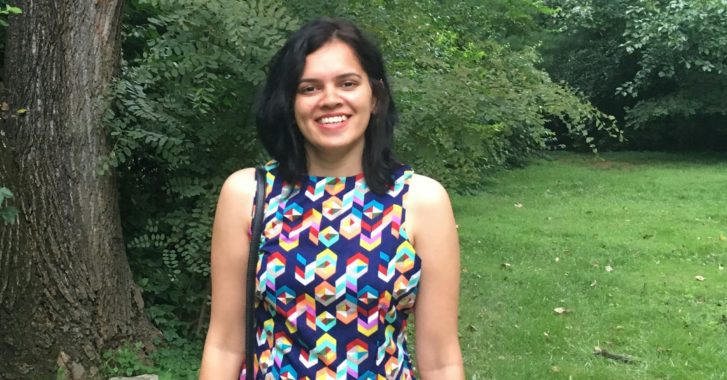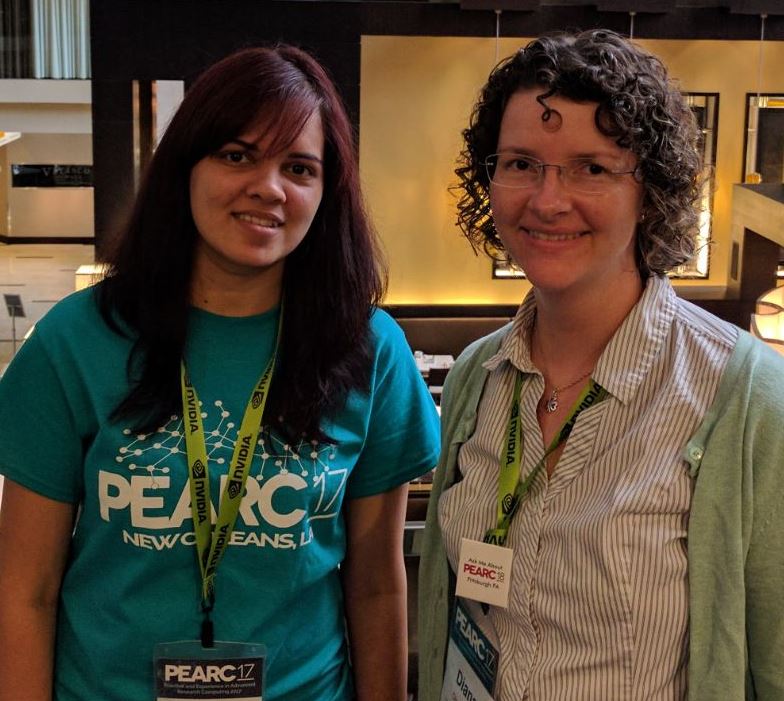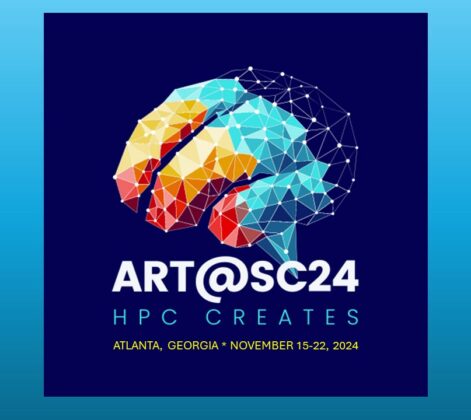By Guest Blogger Bobby Hollingsworth (V-Tech/Harvard), with assistance from Erica Corder (V-Tech)
Sneha Tilak (Indiana University at Bloomington) sees a silver lining in cloud computing. Now a second-year master’s student studying computer science at IU, she is reaching for the sky with a career in distributed computing.
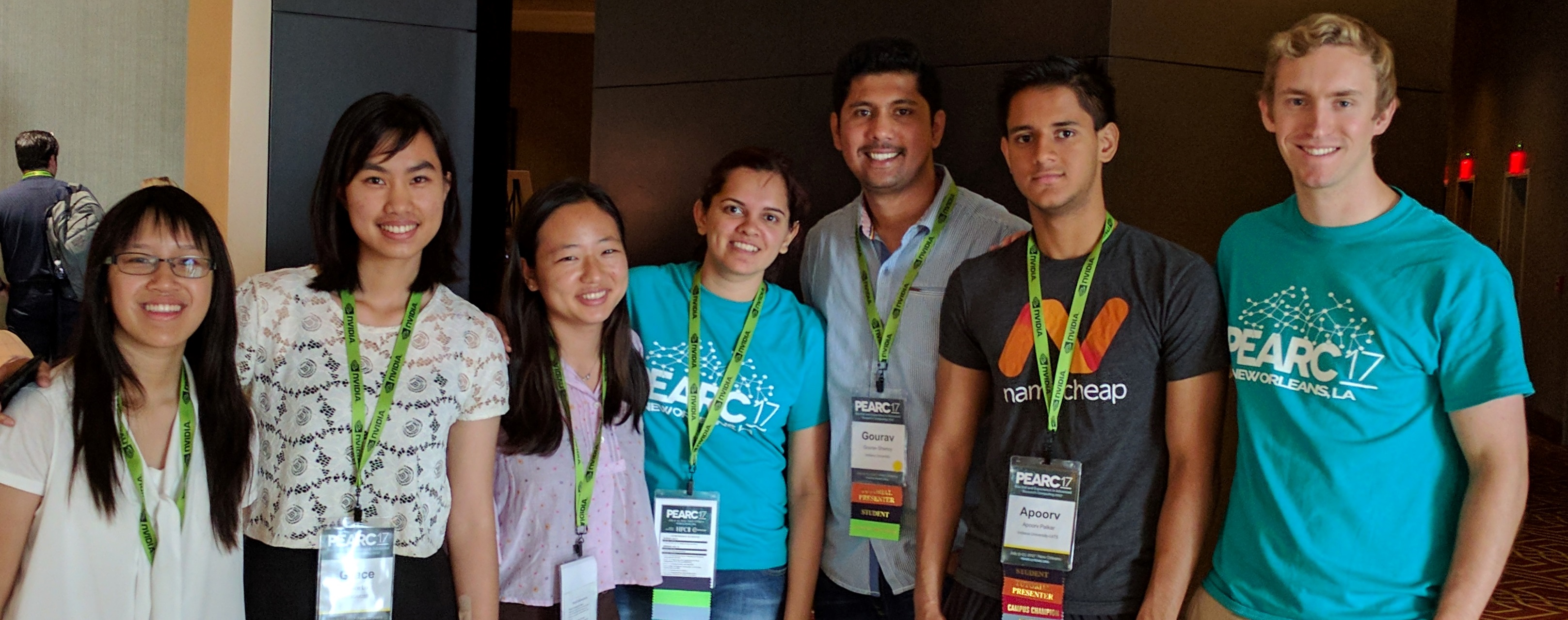
Tilak (center) with fellow PEARC17 Student Program participants, and Guest Blogger Bobby Hollingsworth (right)
Tilak was among 66 students from dozens of U.S. colleges and universities who attended the Practice & Experience in Advanced Research Computing (PEARC17) conference last week. Her PEARC17 participation was supported by Google, Micron Foundation and the Science Gateways Community Institute (SGCI) via their donations to STEM-Trek Nonprofit.
Tilak has been interested in computer science (CS) since the 9th grade when she took an elective CS course in high school. Later at the Visvesvaraya Technological University in Belgaum, India, Tilak held multiple internship positions and worked on projects that exposed her to different frontiers and opportunities in computing. After graduation, she worked as a client programmer at Infosys for two years before entering graduate school at IU.
Two courses in her master’s degree program first exposed Tilak to high performance computing (HPC). Both involved science gateways, which accommodate domain-based communities of practice with collections of HPC resources and applications that are assembled by scientists for research in their domain. Gateways have the added benefit of making computational resources user-friendly, and democratize access for people with a broader range of skills.
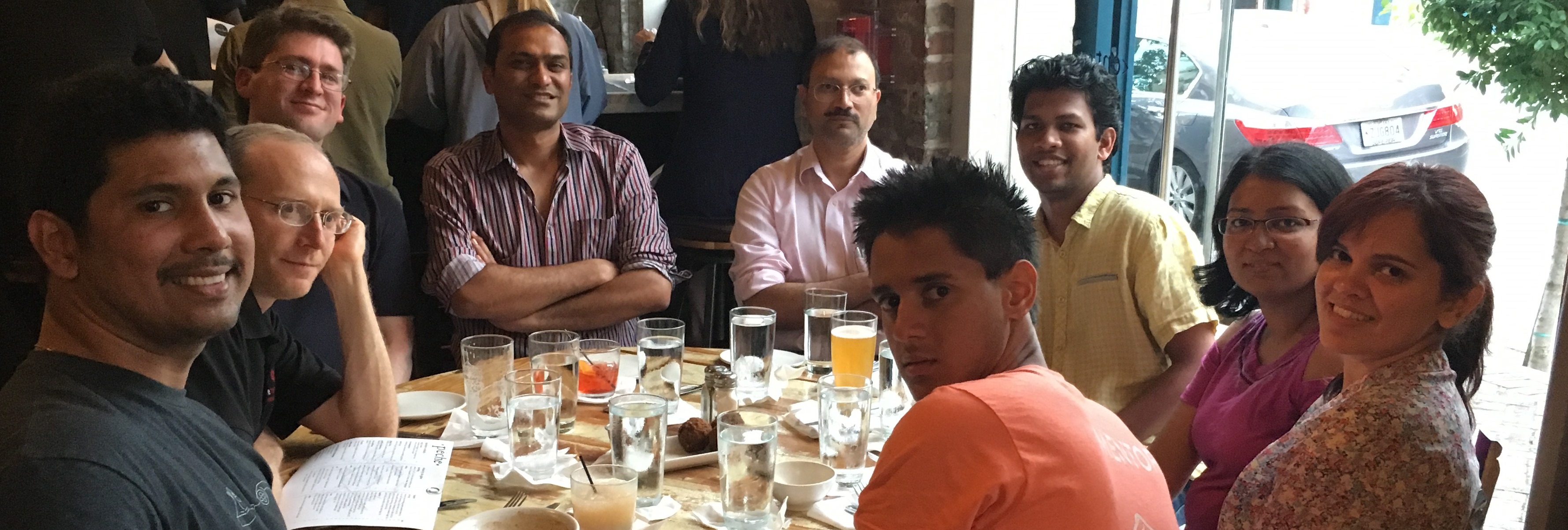
In New Orleans, Tilak (right) met with colleagues from IU who also work with the open source Apache platform, and/or Google’s “Summer of Code” initiative.
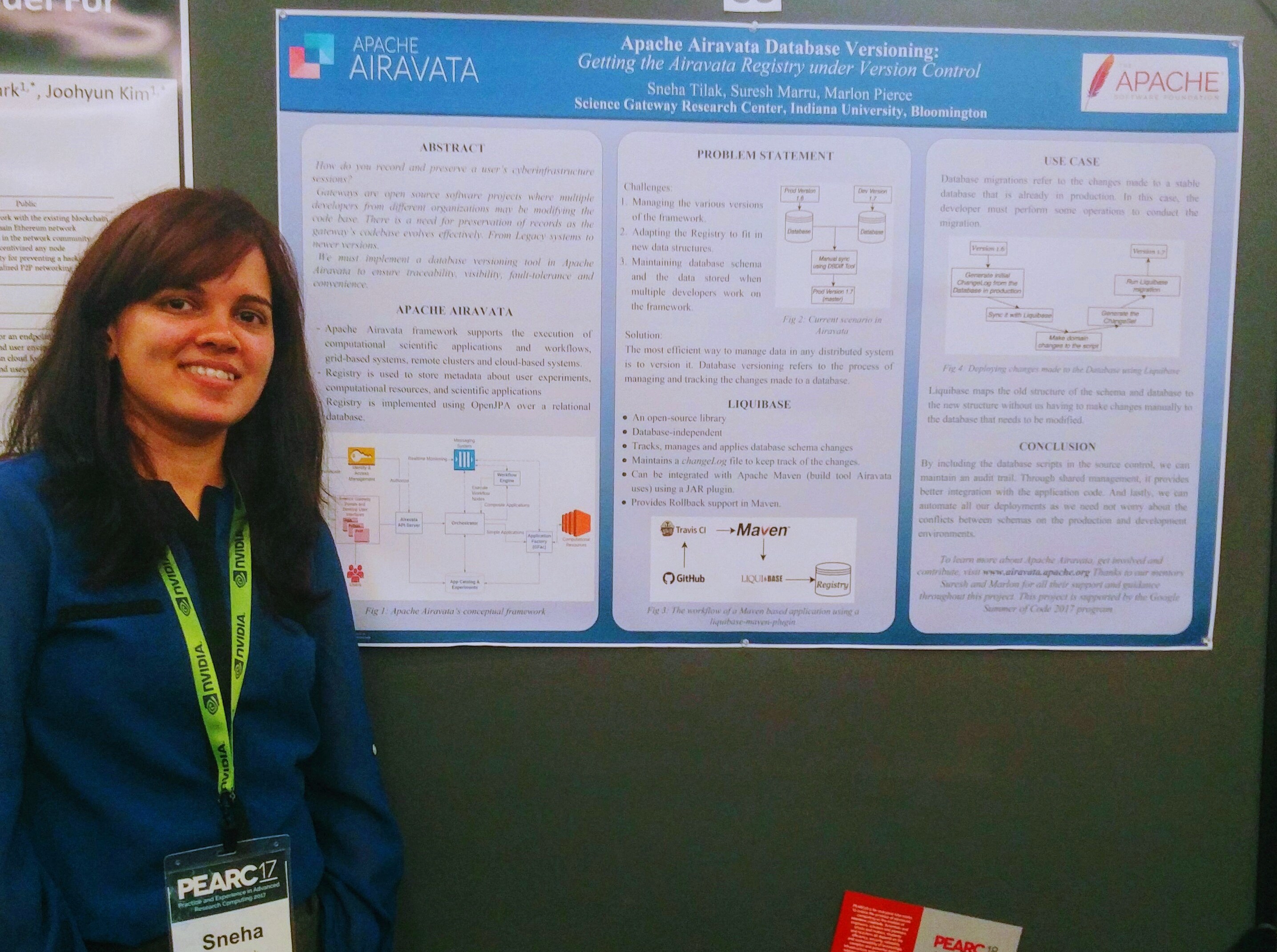 Tilak works to build more robust infrastructure for science gateways and contributes to the open-source Apache platform. Based on her work in Apache Airavata, Tilak was selected to participate in Google’s “Summer of Code” initiative, a program that rewards promising students for open-source development. She lacked opportunities to conduct formal research prior to her master’s program, but at her first poster presentation, titled “Database Versioning in Apache Airavata,” her graduate research attracted the interest of professionals who wanted to incorporate her workflow and open-source code into their own systems.
Tilak works to build more robust infrastructure for science gateways and contributes to the open-source Apache platform. Based on her work in Apache Airavata, Tilak was selected to participate in Google’s “Summer of Code” initiative, a program that rewards promising students for open-source development. She lacked opportunities to conduct formal research prior to her master’s program, but at her first poster presentation, titled “Database Versioning in Apache Airavata,” her graduate research attracted the interest of professionals who wanted to incorporate her workflow and open-source code into their own systems.
IU’s Science Gateways Research Center is led by Marlon Pierce (second from left in the above photo). He said, “We really enjoy the opportunity to work with Sneha and her student-colleagues at IU. As developers of open source software and operators of cyberinfrastructure services in academia, we face a hiring challenge. Luckily, we have access to talented young people, like Sneha, who are looking for challenging work that will allow them to distinguish themselves before they move into the next phase of their careers. Attending PEARC was an important element of Sneha’s professional development, as it gave her a chance to become a better communicator with a diverse group of people and to see her work in the broader context on academic computing. I believe she has made excellent use of this opportunity.”
Suresh Marru (fourth from left in the above photo) is vice president of the Apache Aravata Project and deputy director of the IU Pervasive Technology Institute’s Science Gateways Research Center. He advises Tilak’s work with Apache, and recalled how the opportunity to attend such professional technical conferences helped to shape his career. He expressed appreciation for STEM-Trek and its supporters for having made it possible for Tilak and many others to attend PEARC17. “Sneha and the Science Gateway student community at large must keep up with cutting edge (and some disruptive) technology trends so they can be used to advance science and engineering,” he said. “The conference experience and the people they meet from a wide range of domains will help them connect challenging and ever-emerging fields, while sharpening their perspectives. Bringing everything into context with Open Source, in general, and Apache Software Foundation, specifically, will enhance the downstream impacts in many domains,” he added.
“This was my first experience with an (XSEDE) PEARC conference, and it was wonderful,” Tilak said. “I learned a lot from the tutorials, talks, and from my conference mentor, Diana Dugas (NMSU). I’m grateful to STEM-Trek supporters and Elizabeth Leake for having given me the perfect opportunity to further explore the research side of computer science and to network with a talented bunch of people from the computing world.”
Upon graduating, Tilak hopes to work for a commercial cloud provider, such as Google. Additionally, she hopes to continue developing open-source projects with platforms such as Apache in her free time.
Outside of academics, Tilak hikes, kayaks, and enjoys movies — so much so, she has set an ambitious personal goal to watch every movie on the IMDb Top 250 list.
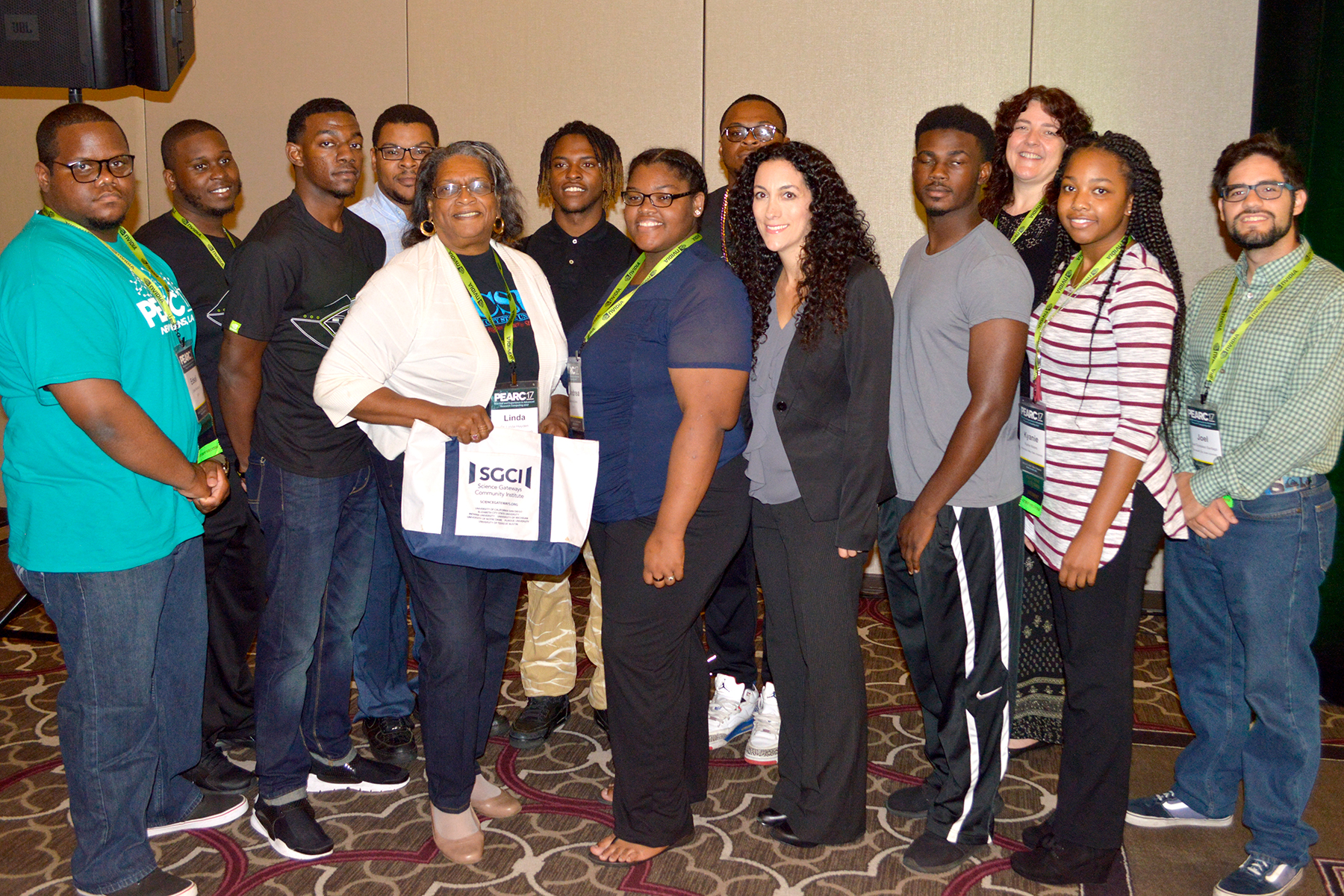
Eleven students attended PEARC17 with the Science Gateways Community Institute (SGCI), shown here with Advisers Linda Hayden (ECSU/SGCI, holding the SGCI bag), Maytal Dahan (TACC, center/right), and Sandra Gesing (ND/SGCI, back row far right). Watch for more about SGCI @PEARC17 next week!
_____
The PEARC17 Student Program was chaired by Alana Romanella (Virginia Tech), with committee members: Kate Cahill (Oklahoma State University); Peter Enstrom (NCSA); Ricardo Gonzalez (University of Puerto Rico/Mayagüez); Elizabeth Leake (STEM-Trek); Melissa Romanus (Rutgers); Semir Sarajilik (Georgia State University); and Ester Soriano (NCSA).

